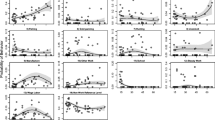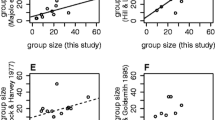Abstract
Empirical analyses of techniques for observing spontaneous social behavior have been guided by implicit assumptions about the techniques’ validity, reliability, and comparability. The actual duration and actual frequency of a behavior have been used as intuitive standards of validity. Noncorrespondence among absolute values obtained from these measures and from one-zero scores has been taken to mean that one-zero scores are invalid. An analysis of macaque and gelada grooming relationships demonstrated how unjustified assumptions about absolute values can affect conclusions. A statistical comparison of four types of observation scores, and a multiple-regression analysis of one-zero scores, contradicted assumptions made previously about reliability and validity. The four methods were comparable and all were reasonably accurate.
Similar content being viewed by others
References
Altmann, J., 1974. Observational study of behavior: sampling methods.Behaviour, 48: 1–41.
Altmann, S. A. &S. S. Wagner, 1970. Estimating rates of behavior from Hansen frequencies.Primates, 11: 181–183.
Anastasi, A., 1976.Psychological Testing. Macmillan, New York.
Dunbar, R. I. M., 1976. Some aspects of research design and their implications in the observational study of behaviour.Behaviour, 58: 78–98.
Feinberg, S. E., 1972. On the use of Hansen frequencies for estimating rates of behavior.Primates, 13: 323–326.
Guilford, J. P., 1954.Psychometric Methods. McGraw-Hill, New York.
Hendy-Neely, H. &R. J. Rhine, 1977. Social development of stumptail macaques (Macaca arctoides): Momentary touching and other interactions with adult males during the infants’ first 60 days of life.Primates, 18: 589–600.
Hinde, R. A. &Y. Spencer-Booth, 1967. The behaviour of socially-living rhesus monkeys in their first two and one-half years.Anim. Behav., 15: 169–196.
Kraemer, H. C., 1979. One-zero sampling in the study of primate behavior.Primates, 20: 237–244.
Leger, D. W., 1977. An empirical evaluation of instantaneous and one-zero sampling of chimpanzee behavior.Primates, 18: 387–393.
Redican, W. K., 1977. Time-sampling observational strategies. Paper presented at the meetings of the American Society of Primatologists, Seattle.
Rhine, R. J. &M. Flanigon, 1978. An empirical comparison of one-zero, focal-animal and instantaneous methods of sampling spontaneous primate social behavior.Primates, 19: 353–361.
———— &C. Kronenwetter, 1972. Interaction patterns of two newly formed groups of stumptail macaques (Macaca arctoides).Primates, 13: 19–33.
Simpson, M. J. A. &A. E. Simpson, 1977. One-zero and scan methods for sampling behaviour.Anim. Behav., 25: 726–731.
Suomi, S. J. &H. F. Harlow, 1972. Social rehabilitation of isolate-reared monkeys.Develop. Psychol., 6: 487–496.
Author information
Authors and Affiliations
About this article
Cite this article
Rhine, R.J., Linville, A.K. Properties of one-zero scores in observational studies of primate social behavior: The effect of assumptions on empirical analyses. Primates 21, 111–122 (1980). https://doi.org/10.1007/BF02383828
Received:
Accepted:
Issue Date:
DOI: https://doi.org/10.1007/BF02383828




